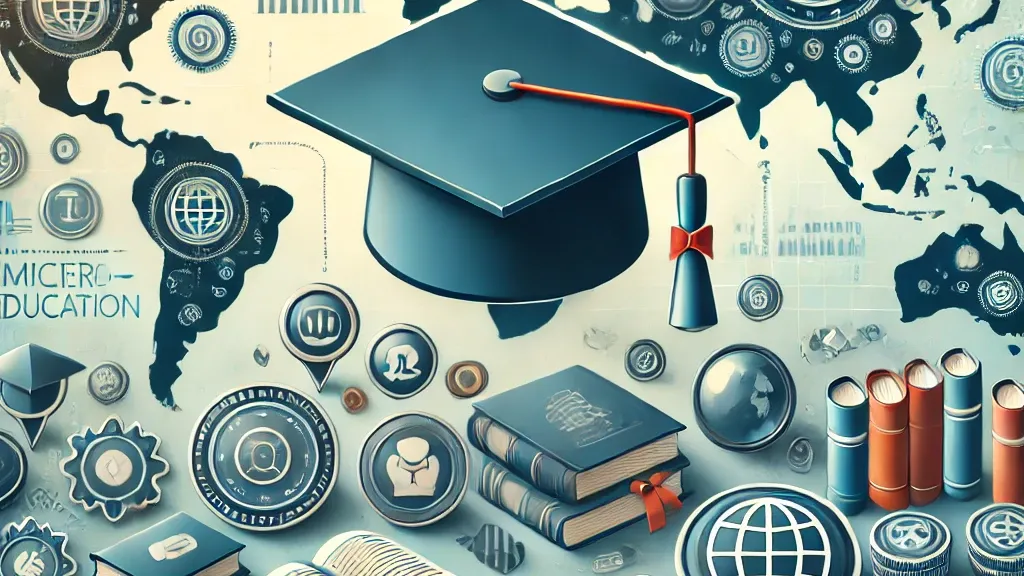Introduction: Understanding Micro-Credentials and Digital Badges
The job market is increasingly demanding specialized skills and knowledge that traditional degree programs often can’t deliver in a timely way. Micro-credentials and digital badges, which focus on specific competencies and skills, allow individuals to adapt and upskill continuously throughout their careers. These tools are reshaping the concept of lifelong learning, making it accessible, affordable, and relevant to modern needs. As we explore this shift, it’s essential to understand not only what micro-credentials and digital badges are but also why they’re rapidly gaining traction across industries and educational settings.
What Are Micro-Credentials and Digital Badges?
Micro-credentials and digital badges are designed to signal specific competencies in a focused area of study, without requiring a multi-year commitment. Here’s a closer look at their unique characteristics and functions:
- Micro-Credentials: These qualifications are akin to “mini-degrees,” designed for quick, skill-specific learning that directly addresses market needs. Often delivered by universities, professional organizations, or corporate entities, micro-credentials cover diverse topics, from coding and digital marketing to specialized soft skills. Unlike traditional degrees, micro-credentials often include a hands-on, project-based approach, making them highly relevant to real-world applications.
- Digital Badges: More than a visual icon, digital badges contain metadata that verifies the learner’s accomplishment, including information about the institution, criteria met, and evidence of skills. By embedding digital badges on professional profiles, individuals communicate their expertise in a transparent, verifiable way. Companies like Mozilla, IBM, and Microsoft pioneered digital badging, setting a trend that has permeated multiple sectors.
Platforms like LinkedIn Learning, Coursera, and even corporate-sponsored programs use these tools, allowing users to present a personalized portfolio that’s easily shared on social media, resumes, and personal branding platforms. As a result, micro-credentials and digital badges are becoming recognized as valuable currency in a knowledge-driven economy.
Why Are Micro-Credentials and Digital Badges Gaining Popularity?
The popularity of micro-credentials and digital badges reflects broader societal trends:
- Demand for Skill Specialization: The Fourth Industrial Revolution is characterized by rapid technological advancements that necessitate new skills in fields like artificial intelligence, blockchain, cybersecurity, and digital marketing. Micro-credentials enable workers to gain these specialized skills, aligning with the latest industry standards and practices.
- Changing Nature of Work and Lifelong Learning: The “learn-earn-return” model of traditional education, which involves a one-time degree followed by a lifelong career, no longer applies to most individuals. Instead, lifelong learning is now an expectation in many industries, particularly for fields like tech and healthcare. Micro-credentials allow people to continually update their skill sets to remain competitive.
- Affordable Access: Tuition rates for traditional college programs have risen sharply, creating significant barriers. Micro-credentials are far more affordable, making education accessible to a broader demographic. Many companies even cover these costs, recognizing the strategic value of upskilling.
- Employer Recognition and Value: More companies are starting to regard micro-credentials as valid evidence of professional skills. A LinkedIn survey found that 58% of hiring managers view non-traditional education, including digital badges, favorably as an alternative to traditional degrees, provided they are from reputable institutions.
As demand for micro-credentials grows, we can expect to see more companies and educational institutions partnering to deliver these skill-focused programs, potentially reshaping the value of traditional qualifications.
Impact on Traditional Education and Career Development
Micro-credentials are reshaping not only individual career paths but also the way educational institutions approach teaching and skill-building.
- Integration with Traditional Programs: Many universities now offer micro-credentials that can be “stacked” toward a full degree. For example, MIT offers the MITx MicroMasters program in data science, which provides graduate-level learning at a fraction of the cost. Credits from the MicroMasters can then be applied toward a full degree, bridging the gap between conventional degrees and modern, targeted skill-building.
- Bridging Skills Gaps: Employers often find that recent graduates lack practical experience in specific areas. Micro-credentials provide an avenue for students to gain these skills, making them more marketable and better prepared for the realities of the workplace.
- Creating Diverse Learning Pathways: Micro-credentials have democratized access to quality education, allowing individuals who may not have the time or financial means for a traditional degree to access skill-based education. For example, Google’s Career Certificates program offers credentials in areas like IT support, project management, and data analytics, which can be completed in 6 months or less, enhancing employability for those without advanced degrees.
The impact of micro-credentials on the workforce is evident. A study by Burning Glass Technologies found that, on average, individuals with relevant micro-credentials earn 25% more than those without. This shift underscores the importance of targeted, market-relevant education that keeps pace with workforce needs.
Types of Micro-Credentials and Badges in Demand
Some of the most in-demand micro-credentials are concentrated in technology and soft skills, with many others expanding across specific industries:
- Technical Skills and Emerging Technologies: Skills in cloud computing, AI, cybersecurity, and data science are among the most sought-after micro-credentials. AWS, Google Cloud, and Microsoft Azure each offer specific certifications designed to validate proficiency in cloud technologies.
- Soft Skills and Management: Leadership, communication, and adaptability are just as crucial as technical skills. For instance, IBM offers a digital badge in Design Thinking, emphasizing collaborative problem-solving skills essential in many industries.
- Healthcare Certifications: The healthcare industry is rapidly adopting micro-credentials to meet ongoing skills gaps, particularly in areas like telehealth, medical billing, and healthcare technology. Providers such as the American Health Information Management Association (AHIMA) offer recognized credentials in areas like healthcare data analytics and clinical documentation.
- Finance and Accounting: Micro-credentials in areas such as financial planning, data analytics, and compliance are in high demand, especially with the rise of fintech. The Association of Chartered Certified Accountants (ACCA) and other professional organizations are providing accessible, short-term certifications to meet these demands.
These credentials allow learners to maintain relevant, high-value skills that directly address gaps in their industry, keeping them adaptable and ready for new challenges.
Real-World Applications of Micro-Credentials
Micro-credentials and digital badges are making a significant impact across various industries. Here are some real-world applications:
- Tech Industry: Many tech giants have developed their own micro-credentials to attract talent with specific skill sets. Google’s IT Support Professional Certificate has helped thousands of learners secure roles within the tech sector by providing foundational IT skills at a low cost.
- Finance and Fintech: In finance, organizations like the CFA Institute and NASDAQ now offer micro-credentials for emerging finance skills like ESG (environmental, social, and governance) investing and digital asset management. These badges are instrumental for finance professionals seeking to specialize in trending areas within the industry.
- Education and Corporate Training: Educational institutions and corporations are increasingly adopting micro-credentials as part of their professional development programs. For example, Adobe offers digital badges for completing its Creative Cloud software courses, making it easy for designers to showcase their proficiency across Adobe’s suite of tools.
A PwC study found that 74% of employees consider micro-credentials as valuable as or more valuable than a college degree, highlighting a shift in perception that is opening doors for professionals across sectors.
Pros and Cons of Micro-Credentials and Digital Badges
Pros:
- Flexible and Affordable: Micro-credentials can be completed in a matter of weeks and are generally more affordable than traditional degree programs.
- Employer-Driven: Many micro-credentials are created in collaboration with industry experts, ensuring their relevance to today’s job market.
- Ease of Access: These credentials are often accessible online, democratizing education for individuals from various socioeconomic backgrounds.
Cons:
- Quality Variation: Not all micro-credentials are created equal, and there is no universal standard to evaluate them.
- Perceived Value: While acceptance is growing, some employers may still view traditional degrees as more credible.
- Market Saturation: As the popularity of micro-credentials grows, the market is becoming increasingly saturated, making it harder for employers to differentiate between high and low-quality credentials.
Future of Lifelong Learning with Micro-Credentials and Digital Badges
The future of micro-credentials and digital badges appears bright, with several promising trends on the horizon:
- Expanded Partnerships with Employers: More companies are expected to partner with educational providers to develop custom micro-credentials that meet specific workforce needs.
- Standardization and Quality Control: Industry-wide standards may emerge to regulate the quality and consistency of micro-credentials, making them more universally recognizable.
- Increased Acceptance in Academia: Universities may increasingly allow students to stack micro-credentials toward degrees, blending traditional and modern approaches to education.
Micro-credentials are likely to become a core component of the lifelong learning ecosystem, equipping individuals to succeed in a workforce that values agility, specialization, and continuous growth.
Conclusion: Embracing a New Era of Education
As technology and job requirements evolve, micro-credentials and digital badges offer a dynamic, responsive approach to education. Their impact on career development, education systems, and industry standards underscores their growing value. In this era of lifelong learning, these innovative credentials allow professionals and individuals to remain adaptable, competitive, and prepared for the evolving demands of the workforce. Unlike traditional degrees that are typically static and foundational, micro-credentials provide an agile educational approach, allowing learners to update or refine their skills as the landscape changes. This dynamic quality makes them especially valuable in fields with rapidly shifting technologies and practices, such as information technology, healthcare, finance, and digital media.
Micro-credentials not only bridge the gap between academia and industry needs but also empower learners with the autonomy to shape their educational journey based on career aspirations. They align with the demands of a knowledge-based economy where continuous improvement is not just beneficial but often necessary for career advancement.
As education systems increasingly adopt these innovative formats, the lines between formal and informal education continue to blur, creating a holistic model where learning is truly a lifelong journey. Micro-credentials and digital badges are indeed paving the way toward a future where education is more accessible, specialized, and attuned to the aspirations and needs of individuals around the world.
In Summary: Micro-credentials and digital badges are revolutionizing education by providing targeted, skill-based learning opportunities that are flexible, affordable, and closely aligned with the needs of modern industries. With their increasing adoption across educational institutions, corporations, and professional sectors, these innovative tools are not only reshaping how we learn but are also redefining how we measure and showcase our skills. This shift promises a more inclusive, adaptable, and effective education model that truly empowers individuals to take charge of their lifelong learning journey, keeping pace with the demands of an ever-evolving global job market.

